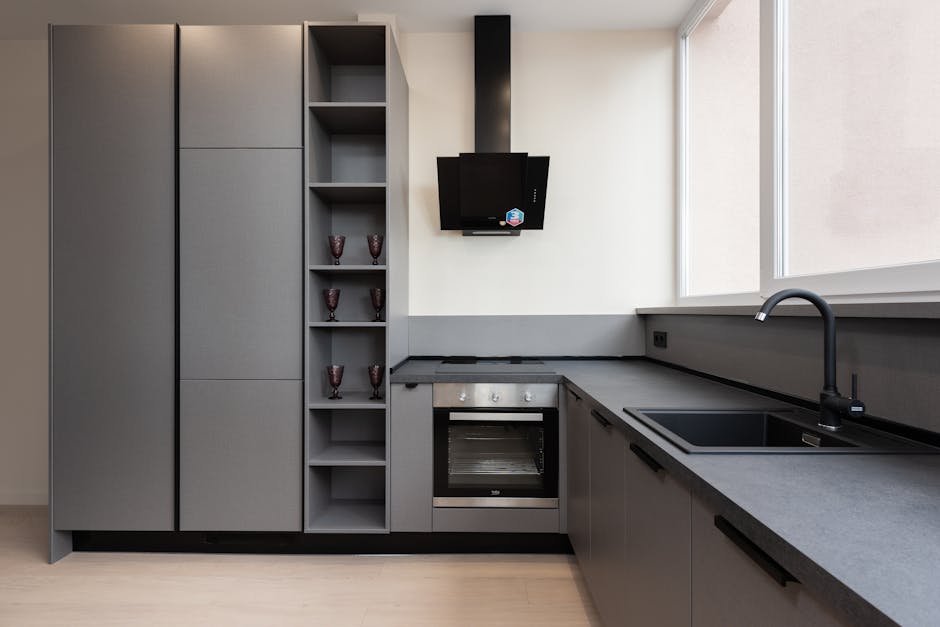Modern Kitchen Layouts: Innovative and Efficient Designs
The kitchen has long been the heart of the home, a place where functionality meets creativity. As lifestyles shift and technology advances, modern kitchen layouts are evolving to reflect these changes. Today’s kitchens are no longer just spaces for cooking; they are multifunctional hubs that cater to dining, entertaining, and even remote work.

Innovations in design and efficiency have transformed the traditional kitchen into a highly personalized space that maximizes both utility and style.
Optimizing Space with Layout Configurations
Kitchen layouts play a crucial role in determining how effectively the space functions. Choosing the right configuration depends on the size of the area, personal preferences, and specific needs. Among the most popular layouts are the galley kitchen, L-shaped kitchen, U-shaped kitchen, and island-based designs.
The galley kitchen, Is an excellent choice for smaller spaces. With parallel countertops and efficient workflows, this layout is perfect for maximizing storage and creating a streamlined cooking experience. On the other hand, L-shaped kitchens provide flexibility by offering open ends, which allow for seamless integration with dining or living areas.
For larger spaces, U-shaped kitchens offer ample counter space and storage options. This layout creates an ergonomic working triangle between the sink, stove, and refrigerator. Adding an island to this setup can further enhance functionality by serving as a prep station or dining spot.
An emerging trend is the use of multifunctional islands in kitchen design. Beyond providing additional workspace, islands now incorporate features such as built-in appliances, hidden storage, and seating areas. They transform kitchens into social gathering points while maintaining efficiency.
Innovative Technologies in Kitchen Design
Modern kitchens increasingly integrate technology to improve usability and sustainability. From smart appliances to energy-efficient fixtures, technological advancements have revolutionized how we interact with our culinary spaces.
Smart refrigerators equipped with touch screens allow users to track groceries, plan meals, or even browse recipes online. Induction cooktops have gained popularity due to their energy efficiency and precise temperature control. Meanwhile, motion-sensor faucets contribute to water conservation without compromising convenience.
Lighting also plays a significant role in setting the mood and enhancing functionality in modern kitchens. LED lighting systems not only save energy but also provide customizable options like under-cabinet illumination or adjustable color temperatures. These small yet impactful details create a well-lit environment conducive to cooking and entertaining.
Sustainability is another key consideration in contemporary kitchen designs. Many homeowners now opt for eco-friendly materials like bamboo countertops or recycled glass tiles. Combining these materials with energy-efficient appliances reduces environmental impact while maintaining aesthetic appeal.
Blending Aesthetics with Practicality
Designing a modern kitchen involves striking a balance between aesthetics and practicality. The choice of materials, colors, and finishes significantly influences the overall look and feel of the space.
Open shelving has become a trendy alternative to traditional cabinets. Not only does it make kitchens appear more spacious, but it also offers an opportunity to display stylish dishware or decorative items. Open shelving requires careful organization to avoid visual clutter.
The use of contrasting textures adds depth and character to modern kitchens. Pairing matte cabinetry with glossy countertops creates visual interest without Similarly, natural materials like wood or stone can add warmth to otherwise minimalist designs.
Neutral color palettes remain popular due to their timeless appeal and versatility. Shades of white, gray, and beige create a clean backdrop that complements various design elements. To add personality, consider incorporating bold accents through hardware or backsplashes.
| Feature | Practical Benefit |
|---|---|
| Open Shelving | Makes space appear larger; accessible storage |
| Multifunctional Islands | Adds prep space; integrates seating |
| Smart Appliances | Improves convenience; energy efficiency |
| LED Lighting Systems | Saves energy; customizable ambiance |
| Sustainable Materials | Eco-friendly; reduces environmental impact |
Catering to Diverse Lifestyles
A well-designed kitchen should cater not only to culinary needs but also to lifestyle preferences. Open-concept kitchens are ideal for those who love entertaining guests while cooking. These layouts remove barriers between cooking and socializing areas, creating an inclusive environment.
For families with children, safety features become paramount. Rounded countertop edges, child-proof cabinet locks, and slip-resistant flooring ensure a secure space for little ones while maintaining an elegant appearance.
If your lifestyle includes working from home or homeschooling children, integrating a small desk area within the kitchen can be highly practical. This setup allows multitasking without feeling disconnected from household activities.
The increasing popularity of urban living has also influenced kitchen designs tailored for compact apartments. Space-saving solutions such as pull-out pantries or foldable dining tables maximize utility without sacrificing comfort.
- Consider your daily routines when planning your kitchen layout.
- Select finishes that are easy to clean and maintain for long-term functionality.
- Integrate lighting solutions that match both aesthetic preferences and practical needs.
- Ensure that any added features complement your lifestyle seamlessly.
The result is a personalized space that not only meets functional requirements but also reflects individual tastes and habits.
A Final Thought on Modern Kitchen Designs
The beauty of modern kitchen layouts lies in their ability to adapt to changing lifestyles while retaining timeless functionality. By incorporating innovative technologies and sustainable practices alongside aesthetic considerations, these spaces evolve into more than just cooking zones, they become integral parts of our daily lives that inspire connection and creativity.
A thoughtfully designed kitchen can influence more than just meal preparation; it can shape how we live in our homes. Whether you're planning a renovation or simply exploring ideas for future projects, understanding these principles will help you create a space that aligns with your aspirations. The modern kitchen isn't just about keeping up with trends, it's about crafting an environment where form meets function harmoniously.
